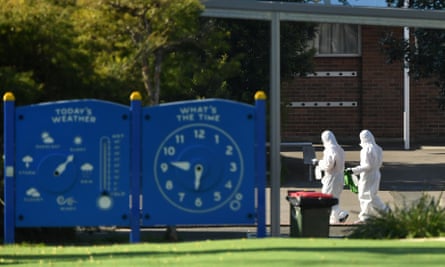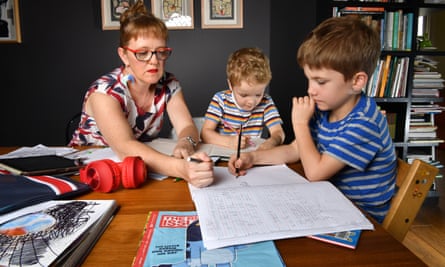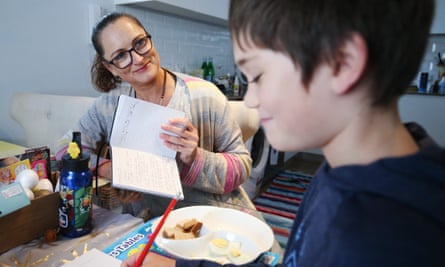In Pasi Sahlberg’s Sydney home, not all the schoolwork is being done. The deputy director of UNSW’s Gonski Institute for Education is in lockdown with two primary school aged children, and as the weeks of home learning drag on, classwork tasks are not always completed. “The kids just can’t do this every day,” he says. It just cannot happen.
“My message to parents is to not feel guilty about it.”
At desks and on dining tables in thousands of homes now across the country, children are trying to learn to read and add, or analyse Hamlet and pick apart advanced calculus, again without the in-person direction of their teachers or the companionship of their peers. As lockdowns and school closures return and extend for many children, there is an undercurrent of anxiety for young people of all ages about what precisely they are learning from home, and whether they will fall behind as a cohort for good.
Last September, the OECD released a report warning of the possible economic impact of “learning loss” among children unable to attend school due to coronavirus lockdowns worldwide. The report foretold of a 3% reduction in earning capacity for children of lockdown and hits of 1.5% to national GDPs, while conceding that “nobody can predict perfectly how school closures will affect the future development of the affected children”.
So how real is the threat of significant learning loss and how does this potential loss stack up against the very real threat of diminishing mental health?
“There’s no need to panic,” says Prof Jenny Gore, head of the Teachers and Teaching Research Centre at the University of Newcastle. “There’s so much speculation and opinion, and very little rigorous empirical research into the effects of Covid on student learning.”

Gore’s team released a study early this year on the impact of the eight-week NSW lockdown of last year. In comparing the reading and maths performance of more than 3,000 children in nearly 100 schools in year three and four from 2019 to 2020, the study found that school closures in that state had, on average, no substantial effect on learning.
“I find the term ‘learning loss’ really problematic because it suggests students lost learning. Well, they didn’t lose. They didn’t go backwards. What we found was that all students, at least on average, were learning and gaining new knowledge and so on throughout last year.”
Gore says there is no evidence yet for the impacts of repeated lockdowns. “It is an unknown,” she says. “I think, based on the evidence so far, my best guess would be to say that student learning is going to be OK.”
“It’s probably the $64,000 question that we don’t know the exact answer to yet,” says Professor Sharon Goldfeld, developmental paediatrician at the Murdoch Children’s Research Institute.
“There’s certainly concern around the world that these learning losses will be large. Most importantly, in regard to Australia, there is concern that they will not be equal.”
There is significant concern, shared by all those speaking to Guardian Australia, that extended and repeated lockdowns threaten to exacerbate pre-existing gaps in learning achievement. In Gore’s study of NSW’s 2020 lockdown, the only change in learning achievement was in maths in year three, where children from lower socioeconomic schools were two months behind their 2019 cohort, while children from the middle socioeconomic range schools were two months ahead.
Dr Nicole Brunker, lecturer in education at University of Sydney, says that in her research and work with teachers, there is little evidence that lockdowns threaten learning in particular age groups more so than others.

A number of different factors are at play in impacting whether a student struggles to progress during learning from home, she says, which include socioeconomic factors, whether they were struggling in school before lockdowns, the extent to which a child is predisposed to self-organise and adapt, whether the school is mirroring its in-class approach in its remote learning approach, and whether the child had established a positive use of technology in their social life.
Brunker says talk of wholesale learning loss is “exaggerated”. She says it can panic people, and can ignore that thousands of students in Australia are regularly engaged in remote learning, pandemic or not.
“To me, learning loss is almost like a myth,” says Sahlberg.
“It is an illusion that by going to school that kids will learn everything that teachers are teaching them,” he says. Children and adolescents will forget, will get distracted, will get unmotivated during the course of in classroom learning. Brunker suggests that within a six-hour school day, accounting for distraction, breaks and so on, children are typically learning for just two or three hours.
Sahlberg says that it is the non-academic factors in children’s lives that have more impact on later success: “Much more important powerful things that explain children’s success and future are often not the academic skills, and those are exactly the things that children can learn outside the school,” he says.
“The mistake adults and education systems make is that we are quick to ask about learning losses, but we forget to ask what these kids have learned during this disruption.”
Dr Brunker suggests it is better to frame thinking about school closures in terms of ‘schooling loss’, not ‘learning loss’. This then encompasses the loss of things like school carnivals, concerts and plays – the things that cannot translate to the home realm.
“We might actually see that there are some positives within this. We start looking at the development of autonomy and independence and how that might actually push back on current approaches to schooling – it could really be a positive, and a growth situation for our schools.”
The most important thing for parents to consider right now? “Wellbeing,” says Brunker. “It’s number one.”
“I’m very cautious with this learning loss thing, while accepting and understanding that some children have been left behind, but that should not be the primary concern,” says Sahlberg. “The primary concern, with all aged kids – particularly year 12 – is their mental health and wellbeing.”
There is unambiguous evidence and anecdotal reports of a far more serious impact on wellbeing and mental health. A study from University of Calgary found vastly elevated rates of symptoms of anxiety and depression among children and young people, and studies conducted by Prof Gore’s team have found high levels of concern about student wellbeing once students returned to classrooms after lockdown.
“The lockdown and the remote learning does impact children’s mental health,” says Prof Goldfeld. “I think repeat lockdowns are not the same as the first one. I think we have to be careful about what we extrapolate from that [2020] lockdown.”

There are, however, some things parents and carers can do to support the wellbeing of students isolated from their classrooms.
“One of the things that parents and adults can do – and this includes all aged kids, teenagers and everyone – is to go and play with them,” says Sahlberg.
It sounds naive, says Sahlberg, but while play is a powerful means of learning, particularly for younger children, play can also offer all children and adults a way out of “this horrible situation” and be empowering for adults .
With socialising face-to-face with friends off the cards, parents are the ones left to provide this, and it could have additional benefits. “[In] most families, not all, but in most there’s room for closer relationships with your children,” says Sahlberg.
“There are five key areas of wellbeing – and this goes for adults as well: it’s about play, it’s about getting outside, it’s about exercising, it’s about socialising and it’s about monitoring engagement for news,” says Dr Brunker.
This means not having news on as background, and having age appropriate discussions about what is happening in the world. It means accepting that children may have more screen time, that playing video games online with friends is good socialisation for older teens, setting up Zoom playdates for younger children where a parent might facilitate an activity while the other parents work. Encouraging independent tasks – like setting a Lego challenge where a child might work on something in the late morning with a big reveal at lunch – can benefit both children and the adults around them who need uninterrupted time to work.
But, in supporting wellbeing it also means letting something go. In Sahlberg’s house it is accepting that neither adult will do a full day’s work, and neither child is expected to complete all of theirs.
“We’ve got to accept that not everything will get done,” says Brunker. “We’ve got to accept there will be distractions and ebbs and flows in motivation. We’ve got to accept they need time off, and some kids are going to need to say ‘You know what? I’m not looking at schooling today.’ And that’s OK.”
